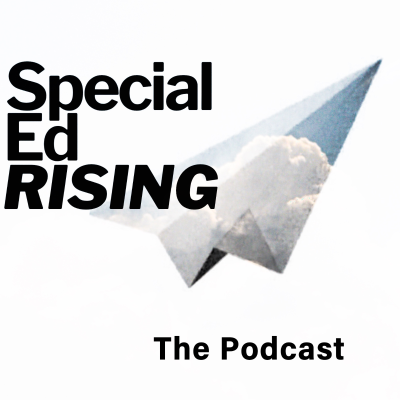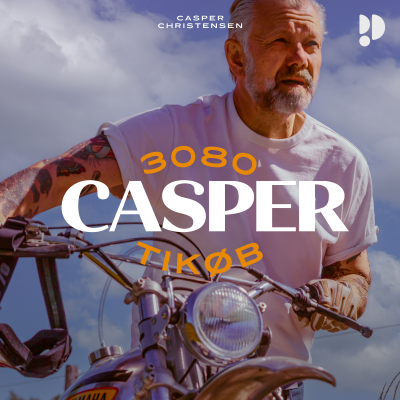
Special Ed Rising; No Parent Left Behind
Podcast by Mark Ingrassia
This podcast is free to listen on all podcast players and the Podimo App without a subscription.
All episodes
109 episodesJenifer Breaux is a Luxury Travel Agent and mother of two special needs children. Six years ago she opened a franchise of Dream Vacations called JB Travel Pros. Included in her work is her focus on helping families of special needs children make wonderful memories through travel. She is the author of Travel IS Possible - How to Travel with Children with Special Needs In this conversation, Mark and Jenifer Breaux discuss the challenges and triumphs of parenting children with special needs, particularly in the context of education and travel. Jenifer shares her experiences as a military parent and how it shaped her approach to travel, emphasizing the importance of advocacy, routine, and creating memorable experiences for families. They explore practical tips for traveling with children who have sensory needs, the significance of social stories, and the value of establishing a vacation routine to reduce anxiety and enhance enjoyment for both parents and children. takeaways * Advocacy is crucial for parents navigating school systems. * Good teachers can make a significant difference in a child's education. * Celebrating small victories is important for children with special needs. * Traveling can provide valuable experiences for families. * Establishing a routine helps children feel secure while traveling. * Social stories can prepare children for new experiences. * Creating a comfortable travel environment is essential for sensory needs. * Parents should not hesitate to seek help and resources. * Traveling with special needs children requires planning and flexibility. * Every family deserves to create lasting memories through travel. Chapters00:00 Introduction and Daily Life of a Busy Parent 01:23 Navigating School Systems and Advocacy 04:19 The Importance of Good Teachers 06:57 Travel as a Means of Creating Memories 09:41 Understanding Sensory Needs in Children 12:33 The Journey into Travel and Military Influence 17:57 Transitioning from Military to Travel Advocacy 20:42 Overcoming Challenges in Special Needs Travel 23:26 Practical Travel Tips for Families 24:13 Embracing Family Travel 30:08 Creating Comfort for Kids 35:44 Planning Memorable Experiences 39:23 Navigating Air Travel with Kids 45:01 Establishing Routines on Vacation 50:56 Resources for Traveling Families https://www.iamjeniferbreaux.com/ Instagram: IAMJENIFERBREAUX [https://www.instagram.com/iamjeniferbreaux/#]
This episode is influenced by my recent conversations with guests on my show; particularly my chat with Taylor Winnett. We spoke about bridging the gap of communication between non-disabled people as they interact with disabled people. How does the conversation begin for someone who is unfamiliar with or has never met a disabled person and therefore may stumble when engaging for lack of appropriate, acceptable and respectful language? How can we get better at inclusive language to move the needle towards greater equality and recognition in all areas of life for all people no matter our differences?
summary In this conversation, Chris Higgins shares his journey as a filmmaker and writer, emphasizing the importance of accessibility in technology and storytelling. He discusses his film 'Access,' which profiles Corey Joseph, a user of assistive technology, and highlights the need for empathy and understanding in creating inclusive designs. The conversation explores the challenges of navigating conversations about disability and the role of generosity in sharing personal stories. In this conversation, Chris Higgins discusses the importance of accessibility in filmmaking, emphasizing the need for inclusive design that accommodates diverse audiences. He shares insights on the role of text and audio description in media, the challenges faced in implementing these features, and the evolving technology that supports accessibility. The conversation highlights the moral imperative of creating inclusive content and the potential impact of films like 'Access' in reducing stigma around disabilities. takeaways * Accessibility is crucial in technology and storytelling. * Empathy is key to understanding the experiences of others. * Filmmaking can be a powerful tool for advocacy. * Corey's story illustrates the importance of lived experiences. * Generosity from subjects can enhance storytelling. * Inclusive design should consider various user needs. * Awkwardness in conversations about disability is natural. * Text can be a fundamental aspect of documentaries. * Universal design benefits everyone, not just those with disabilities. * Creating accessible content requires thoughtful planning. Accessibility is essential for filmmakers to consider. * Text can serve as a universal medium for content. * Audio description enhances the viewing experience for all. * Filmmakers have a responsibility to provide access to their work. * Technology plays a crucial role in supporting accessibility. * Inclusive design can help reduce stigma around disabilities. * Empathy is key in understanding diverse needs. * The evolution of technology will improve accessibility features. * Creating inclusive content is the right thing to do. * Awareness and education are vital for promoting accessibility. titles * Exploring Accessibility in Filmmaking * The Journey of a Filmmaker * Empathy and Storytelling in Documentaries * Corey Joseph: A Story of Accessibility * Navigating Conversations About Disability * The Role of Generosity in Filmmaking Sound Bites * "I had plans, but life happens." * "This is just how reality is for him." * "Corey was really generous." * "What if there's no display?" * "The documentary is text." * "I want to provide the text." * "Can I enjoy this if?" * "Everything I make can be reduced to text." * "This is how I'm learning English." * "It changed me as a filmmaker." * "There's an art to audio description." * "Access is a product of its time." Chapters 00:00 Introduction and Background 03:13 The Journey of Filmmaking and Writing 05:47 The Importance of Accessibility in Technology 09:14 Shifting Perspectives: From Experts to Users 11:57 Corey's Story: A Personal Connection 14:58 Building Empathy Through Storytelling 18:01 The Role of Generosity in Filmmaking 20:59 Navigating Awkward Conversations 24:14 Inclusive Design and Its Challenges 26:56 Universal Design and Accessibility Features 29:58 Exploring Accessibility in Filmmaking 31:56 The Role of Text in Media 33:33 Understanding Audio Description 36:56 Challenges of Implementing Accessibility Features 39:45 Future of Inclusive Design in Film 42:43 The Evolution of Accessibility Technology 54:54 Addressing Stigma Through Inclusive Design Chris Higgins Website: https://chrishiggins.com/w/ https://accessmovie.org/
In this conversation, Taylor Winnett shares her reflections on competing in the Paralympics, and the emotional journey of balancing high expectations with the realities of performance. She discusses her future plans, including moving to Texas, aspirations for world championships, and the possibility of motherhood. Taylor also expresses her desire to coach and the importance of maintaining a positive mindset in sports and life. In this conversation, Taylor Winnett shares her experiences as a Paralympic swimmer, discussing the vibrant atmosphere of the Paralympic Village, the accessibility challenges she faced in Paris, and the social acceptance of athletes with disabilities. She emphasizes the importance of media representation and sponsorship in promoting disability sports and advocates for greater awareness and understanding of the disabled community. Taylor also reflects on the evolving perceptions of disability and the potential for future generations to embrace adaptive sports. Takeaways * The Paralympics provided a humbling experience despite performance disappointments. * It's important to balance high expectations with reality in sports. * Life after the Paralympics involves new challenges and opportunities. * Future plans include moving, competing, and possibly starting a family. * Coaching can be a fulfilling path for athletes post-competition. * Maintaining a positive mindset is crucial in sports and life. * Friendships formed through sports can last a lifetime. * The Paralympic village was a unique and accessible environment. * Personal growth often comes from navigating challenges. The Paralympic Village offers a unique and supportive environment for athletes. * Accessibility in cities like Paris has improved, but challenges remain. * Social acceptance of disabilities is crucial for athletes' experiences. * Media representation can significantly impact public perception of disability sports. * Sponsorship and support from companies are vital for Paralympic athletes. * Personal stories of athletes can inspire others with disabilities. * Awareness and advocacy work are essential for changing societal views. * The classification system in sports can be complex but also offers unique opportunities. * Curiosity about disabilities should be approached with respect and understanding. * The journey of athletes with disabilities can inspire future generations. Sound Bites * "I gained time in every event." * "I wanted to show that to the world." * "I'm worth more than an athlete." * "I want to be a stay-at-home mom." * "I plan to be in LA." * "It was like a disabled utopia." * "I have so many pins." * "I cried when my roommate medaled." * "The Metro was not accessible." * "I had a great time in the city." Chapters00:00 Snowstorm Adventures in Colorado 06:16 Reflections on the Paralympics Experience 10:43 Balancing Expectations and Reality 19:28 The Journey Ahead: Future Plans and Aspirations 25:11 Coaching Dreams and Life Beyond Swimming 30:17 Exploring the Paralympic Village Experience 32:58 Accessibility in Paris: A Personal Perspective 40:06 Social Acceptance and Recognition of Paralympians 46:51 The Impact of Media and Sponsorship on Disability Sports 54:03 Navigating Curiosity and Respect in Disability Conversations
keywords music education, special education, parental involvement, inclusivity, advocacy, misconceptions, music therapy, child development, songwriting, creativity, parent-teacher relationships, music education, child development, emotional regulation, musical exploration, parenting tips, music in schools, child psychology, music therapy, family bonding summary In this conversation, Giuliana Conti and Mark discuss the vital role of music education, particularly for children with special needs. They explore misconceptions surrounding talent in music, the importance of parental involvement, and the need for advocacy within school systems to ensure that all children have access to music education. Giuliana shares her experiences working with parents and students, emphasizing the necessity of inclusivity and the potential for every child to engage with music, regardless of their background or abilities. The conversation also highlights practical tips for parents to encourage musical exploration at home and the importance of communication between parents and educators. In this conversation, Mark and Giuliana Conti discuss the vital role of music in child development and the importance of fostering positive relationships between parents and teachers. They explore how music can aid in emotional regulation, socialization, and personal identity formation. Giuliana emphasizes the need for parents to engage with their children musically at home, providing opportunities for exploration and creativity. The discussion also highlights the significance of understanding children's musical preferences and the impact of music on their emotional well-being. takeaways * Music education fosters confidence and brain plasticity. * Parents often live vicariously through their children's musical experiences. * There is a misconception that talent is innate and not developed. * Every child is capable of engaging with music given the opportunity. * Music can be integrated into the home environment easily. * Advocacy is crucial for ensuring children receive music education. * Inclusivity in music programs benefits all students, not just those with special needs. * Parents should inquire about their child's IEP and its implications for music education. * Music teachers often lack awareness of students' special needs. * Exploration and exposure to music should start early in a child's life. Parents should approach teachers with the benefit of the doubt. * Building relationships with educators is crucial for child success. * Music exposure in early childhood fosters social and emotional development. * Children's musical preferences can reflect their emotional states. * Music can serve as a tool for emotional regulation in children. * Creating a musically rich environment at home enhances bonding. * Parents should provide opportunities for musical exploration. * Understanding developmental stages helps in parenting decisions. * Encouraging children to express their musical tastes is important. * Music technology can facilitate musical discovery and engagement. titles * Empowering Children Through Music * Creating a Musical Home Environment Creating a Musical Household * The Role of Music in Socialization Sound Bites * "It's a wonderful tapestry of imperfection." * "Music is a necessity for wellbeing." * "Don't believe everything you're told about your child." * "Develop relationships with the teachers at your school." * "Music is such a strong bonding agent." * "Music can be one of those tools that they use." Chapters 00:00 Introduction and Background 02:57 Exploring the Power of Music in Education 06:00 The Role of Parents in Music Education 09:00 Misconceptions About Special Education and Music 11:53 Advocacy for Music Education in Special Needs 14:52 The Importance of Inclusivity in Music Programs 18:01 Practical Tips for Parents to Encourage Music 21:04 Navigating School Systems and Music Education 23:51 Conclusion and Final Thoughts 33:32 Navigating Parent-Teacher Relationships 36:01 The Importance of Music in Early Development 40:31 Understanding Musical Preferences and Socialization 43:12 Music as a Tool for Emotional Regulation 51:52 Engaging Children Musically at Home 01:03:35 Fostering Musical Exploration and Identity https://musicworkshopedu.org/
Available everywhere
Listen to Podimo on your phone, tablet, computer or car!
A universe of audio entertainment
Thousands of audiobooks and exclusive podcasts
No ads
Don't waste time listening to ad breaks when listening to Podimo's content.



















